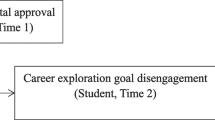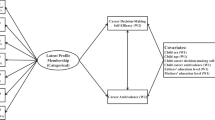Abstract
Research findings suggested that positive parenting behaviors during adolescence continue to have lasting effects on children, even when they enter young adulthood; though few studies have investigated how positive parenting behaviors affect career success in young adulthood. Career success is central to young adults’ identity formation, life satisfaction, marital relations and mental health. In this study, we examine how positive parenting behaviors influence young adults’ career success. Using a large, nationally representative, and longitudinal sample, results from regression analyses suggested that positive parenting behaviors during adolescence were positively associated with young adults’ career outcomes, including career satisfaction, career autonomy, career commitment, and income. Furthermore, the association between positive parenting during adolescence and career success was mediated in part by education attainment in young adulthood.
Similar content being viewed by others
References
Altman, J. H. (1997). Career development in the context of family experiences. In H. S. Farmer (Ed.), Diversity and women’s career development: From adolescents to adulthood (pp. 229–242). Thousand Oaks, CA: Sage.
Amato, P. R., & Beattie, B. (2011). Does the unemployment rate affect the divorce rate? An analysis of state data 1960–2005. Social Science Research, 40, 705–715.
Arnett, J. J. (Ed.). (2002). Readings on adolescence and emerging adulthood. New Jersey: Prentice Hall.
Arum, R., & Hout, M. (1998). The early returns: The transition from school to work in the United States. In Y. Shavit & W. Müller (Eds.), From school to work: A comparative study of educational qualifications and occupational destinations (pp. 471–510). Oxford: Clarendon.
Bandura, A. (1977). Social learning theory. Englewood Cliffs, NJ: Prentice-Hall.
Baron, R. M., & Kenny, D. A. (1986). The moderator–mediator variable distinction in social psychological research: Conceptual, strategic, and statistical considerations. Journal of Personality and Social Psychology, 51, 1173–1182.
Benner, A., & Mistry, R. (2007). Congruence of mother and teacher educational expectations and low-income youth’s academic competence. Journal of Educational Psychology, 99, 140–153.
Biemer, P. P., & Aragon-Logan, E. D. (2010). National longitudinal study of adolescent health: Wave IV weights user guide. North Carolina: RTI International.
Blossfeld, H. P., Klijzing, E., Mills, M., & Kurz, K. (2005). Globalization, uncertainty and youth in society. London, New York: Routledge Advances in Sociology Series.
Boerjan, M., Bluyssen, S., Bleichrodt, R., van Weel-Baumgarten, E., & van Goor, H. (2010). Work-related health complaints in surgical residents and the influence of social support and job-related autonomy. Medical Education, 44, 835–844.
Bozeman, B., & Gaughan, M. (2011). Job Satisfaction among university faculty: Individual, work, and institutional determinants. Journal of Higher Education, 82, 154–186.
Bureau of Labor Statistics. “Employment Situation New Release.” Retrieved November, 2011. Washington, DC: U.S. Department of Labor (bls.gov/schedule/archives/empsit_nr.htm).
Chantala, K. (2006). Guidelines for analyzing Add Health data. National Longitudinal Study of Adolescent Health. Chapel Hill: University of North Carolina.
Cheung, F., & Tang, C. (2010). Effects of age, gender, and emotional labor strategies on job outcomes: Moderated mediation analyses. Applied Psychology: Health and Well-being, 2, 323–339.
Cohrs, J. C., Abele, A. E., & Dette, D. E. (2006). Integrating situational and dispositional determinants of job satisfaction: Findings from three samples of professionals. Journal of Psychology: Interdisciplinary and Applied, 140, 363–395.
Cui, M., Ueno, K., Fincham, F. D., Donnellan, M. B., & Wickrama, K. A. S. (2012). The association between romantic relationships and delinquency in adolescence and young adulthood. Personal Relationships, 19, 354–366.
Cuzzocrea, V. (2011). Squeezing or blurring: Young adulthood in the career strategies of professionals based in Italy and England. Journal of Youth Studies, 14, 657–674.
Day, R., & Allen, T. D. (2004). The relationship between career motivation and self-efficacy with protégé career success. Journal of Vocational Behavior, 64, 72–91.
de Rijk, A. E., Le Blanc, P. M., Schaufeli, W. B., & de Jonge, J. (1998). Active coping and need for control as moderators of the job demand-control model: Effects on burnout. Journal of Occupational and Organizational Psychology, 71, 1–18.
DiPrete, T. A., & Eirich, G. M. (2006). Cumulative advantage as a mechanism for inequality: A review of theoretical and empirical developments. Annual Review of Sociology, 32, 271–297.
Elder, G., & Giele, J. (Eds.). (2009). The craft of life course research. New York: Guilford.
Epstein, J. L. (1995). School/family/community partnerships: Caring for the children we share. Phi Delta Kappan, 76, 701–712.
Erikson, E. H. (1959). Identity and the life-cycle. Psychological Issues, 1, 18–164.
Evans, K., et al. (2001). Reconstructing fate as choice? Young, 9(3), 2–28.
Fan, X., & Chen, M. (2001). Parental involvement and students’ academic achievement: A meta-analysis. Educational Psychology Review, 13, 1–22.
Fass, M. E., & Tubman, J. G. (2002). The influence of parental and peer attachment on college students’ academic achievement. Psychology in the Schools, 39(5), 561–573.
Flouri, E. (2006). Parental interest in children’s education, children’s self-esteem and locus of control, and later educational attainment: Twenty-six year follow-up of the 1970 British birth cohort. British Journal of Educational Psychology, 76, 41–55.
Franz, C. E., McClelland, D., & Weinberger, J. (1991). Childhood antecedents of conventional social accomplishment in midlife adults: A 36-year prospective study. Journal of Personality and Social Psychology, 60, 586–595.
Gibbons, M. M., Woodside, M., Hannon, C., Sweeney, J. R., & Davison, J. (2011). The lived experience of work and career: Women whose parents lack postsecondary education. Career Development Quarterly, 59, 315–329.
Gopalan, G., Cavaleri, M. A., Bannon, W. M., & McKay, M. M. (2009). Correlates of externalizing behavior symptoms among youth within two impoverished, urban communities. Child and Youth Services, 31, 92–120.
Gordon, M., & Cui, M. (2012). The effect of school-specific parenting processes on academic achievement in adolescence and young adulthood. Family Relations, 61, 711–908.
Grandey, A. A., Cordeiro, B. L., & Crouter, A. C. (2005). A longitudinal and multi-source test of the work—family conflict and job satisfaction relationship. Journal of Occupational and Organizational Psychology, 78, 305–323.
Guillory, E. A. (2001). The Black professoriate: Explaining the salary gap for African-American female professors. Race, Ethnicity and Education, 4, 225–244.
Haihua, L., Guoping, S., & Dengfeng, W. (2011). The influence of self-efficacy on flight dispatchers’ stressor-strain relationships. Social Behavior and Personality: An International Journal, 39, 839–850.
Hargrove, B. K., Creagh, M. G., & Burgess, B. L. (2002). Family interaction patterns as predictors of vocational identity and career decision-making self-efficacy. Journal of Vocational Behavior, 61, 185–201.
Harvard family research project: Family involvement network of educators (FINE). Retrieved Nov 1, 2011, http://www.hfrp.org/family-involvement/fine-family-involvement-network-of-educators.
Heslin, P. A. (2005). Conceptualizing and evaluating career success. Journal of Organizational behavior, 26(2), 113–136.
Howard, A. L., Galambos, N. L., & Krahn, H. J. (2010). Paths to success in young adulthood from mental health and life transitions in emerging adulthood. International Journal of Behavioral Development, 34, 538–546.
Hwang, J. I., & Chang, H. H. (2009). Work climate perception and turnover intention among Korean hospital staff. International Nursing Review, 56, 73–80.
Kenny, D. A., Kashy, D., & Bolger, N. (1998). Data analysis in social psychology. In D. Gilbert, S. Fiske, & G. Lindzey (Eds.), Handbook of social psychology (4th ed., pp. 233–265). New York: McGraw-Hill.
Khattab, N., & Fenton, S. (2009). What makes young adults happy? Employment and non-work as determinants of life satisfaction. Sociology, 43, 11–26.
Kim, S., & Brody, G. H. (2005). Longitudinal pathways to psychological adjustment among black youth living in single-parent households. Journal of Family Psychology, 19, 305–313.
Lee, J., & Phillips, S. J. (2006). Work and family: Can you have it all? Psychologist-Manager Journal, 9, 41–57.
Louis, V. V., & Zhao, S. (2002). Effects of family structure, family SES, and adulthood experiences on life satisfaction. Journal of Family Issues, 23, 986–1005.
Mahmood, A., Nudrat, S., Asdaque, M., Nawaz, A., & Haider, N. (2011). Job satisfaction of secondary school teachers: A comparative analysis of gender, urban and rural schools. Asian Social Science, 7, 203–208.
Malanchuk, O., Messersmith, E. E., & Eccles, J. S. (2010). The ontogeny of career identities in adolescence. New Directions for Child and Adolescent Development, 130, 97–110.
Marsiglio, W., Amato, P., Day, R., & Lamb, M. (2000). Scholarship on fatherhood in the 1990s and beyond. Journal of Marriage and the Family, 62, 1173–1191.
Mau, W., & Kopischke, A. (2001). Job search methods, job search outcomes, and job satisfaction of college graduates: A comparison of race and sex. Journal of Employment Counseling, 38, 141–149.
Meyer, J. P., & Allen, N. J. (1991). A three component conceptualization of organizational commitment. Human Resource Management Review, 1, 61–89.
Morgeson, F. P., Delaney-Klinger, K., & Hemingway, M. A. (2005). The importance of job autonomy, cognitive ability, and job-related skill for predicting role breadth and job performance. Journal of Applied Psychology, 90, 399–406.
Mortimer, J. T., Vuolo, M., Staff, J., Wakefield, S., & Wanling, X. (2008). Tracing the timing of “career” acquisition in a contemporary youth cohort. Work and Occupations, 35, 44–84.
Mowday, R., Steers, R., & Porter, L. (1979). The measurement of organizational commitment. Journal of Vocational Behavior, 14, 224–247.
Ng, T. W. H., Eby, L. T., Sorensen, K. L., & Feldman, D. C. (2005). Predictors of objective and subjective career success: A meta-analysis. Personnel Psychology, 58, 367–408.
Paul, K. I., & Moser, K. (2009). Unemployment impairs mental health: Meta-analyses. Journal of Vocational Behavior, 74, 264–282.
Pouliakas, K., & Theodossiou, I. (2010). Differences in the job satisfaction of high-paid and low-paid workers across Europe. International Labour Review, 149, 1–29.
Ram, P., & Prabhakar, G. V. (2010). Determinants of pay satisfaction: A study of the hotel industry in Jordan. European Journal of Social Science, 14, 442–454.
Rasdi, R. M., Ismail, M., Uli, J., & Noah, S. M. (2009). Towards developing a theoretical framework for measuring public sector managers’ career success. Journal of European Industrial Training, 33, 232–254.
Schoen, R., Astone, N., Rothert, K., Standish, N. J., & Kim, Y. J. (2002). Women’s employment, marital happiness, and divorce. Social Forces, 81, 643–662.
Schwartz, N. (1999). Self-reports: How the questions shape the answers. American Psychologist, 54, 93–105.
Seyfried, S., & Chung, I. (2002). Parent involvement as parental monitoring of student motivation and parent expectations predicting later achievement among African American and European American middle school age students. Journal of Ethnic and Cultural Diversity in Social Work, 11, 109–132.
Shanahan, M. J., Mortimer, J. T., & Kruger, H. (2002). Adolescence and adult work in the twenty-first century. Journal of Research on Adolescence, 12, 99.
Shrout, P. E., & Bolger, N. (2002). Mediation in experimental and nonexperimental studies: New procedures and recommendations. Psychological Methods, 7, 422–445.
Staff, J., Harris, A., Sabates, R., & Briddell, L. (2010). Uncertainty in early occupational aspirations: Role exploration or aimlessness? Social Forces, 89, 659–683.
Tourangeau, R. & Shin, H.C. (1999). Grand sample weights. Add Health User Guides. http://www.cpc.unc.edu/projects/addhealth/data/guides. Accessed 12 Nov 2013.
Wang, C., Chen, M., Hyde, B., & Hsieh, L. (2010). Chinese employees’ work values and turnover intentions in multinational companies: The mediating effect of pay satisfaction. Social Behavior and Personality: An International Journal, 38, 871–894.
Weisner, M., Vondracek, F. W., Capaldi, D. M., & Porfeli, E. (2003). Childhood and adolescent predictors of early adult career pathways. Journal of Vocational Behavior, 63, 305–328.
Wilkinson, L. (1999). Statistical methods in psychology journals: Guidelines and explanations. American Psychologist, 54(8), 594.
Acknowledgments
This research was supported by a Grant (1R03HD064836) from the Eunice Kenney Shriver National Institute of Child Health and Human Development. This study uses data from Add Health, a program project directed by Kathleen Mullan Harris and designed by J. Richard Udry, Peter, S. Bearman, and Kathleen Mullan Harris at the University of North Carolina at Chapel Hill, and funded by a Grant P01-HD31921 from the National Institute of Child Health and Human Development, with cooperative funding from 23 other federal agencies and foundations. Special acknowledgement is due Ronald R. Rindfuss and Barbara Entwisle for assistance in the original design. Information on how to obtain the Add Health data files is available on the Add Health website (http://www.cpc.unc.edu/addhealth). No direct support was received from Grant P01-HD31921 for this analysis.
Author information
Authors and Affiliations
Corresponding author
Rights and permissions
About this article
Cite this article
Gordon, M.S., Cui, M. Positive Parenting During Adolescence and Career Success in Young Adulthood. J Child Fam Stud 24, 762–771 (2015). https://doi.org/10.1007/s10826-013-9887-y
Published:
Issue Date:
DOI: https://doi.org/10.1007/s10826-013-9887-y




